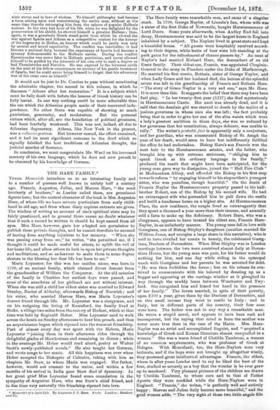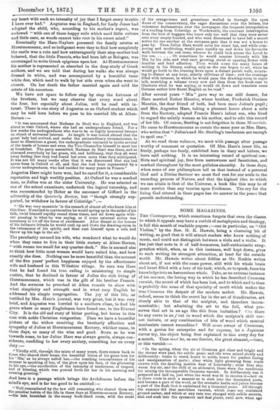THE HARE FAMILY.*
THESE Memorials introduce us to an interesting family and to a number of persons well known in society half a century ago. Francis, Augustus, Julius, and Marcus Hare, " the most brotherly of brothers," as Landor called them, are prominent figures here; but the central character of the book is Mrs. Augustus Hare, of whose life we have minute particulars from early child- hood to old age, and from whose diary copious extracts are given.
The wisdom of writing an account of one's spiritual state may be fairly questioned, and in general there seems no doubt whatever that if such a record be written it should be kept sacred from all eyes. Mrs. Hare, however, gave her adopted son permission to publish these private thoughts, and he cannot therefore be accused of having done anything injurious to her memory. " When she was passing away from me," he writes, "she permitted me, if I thought it could be made useful for others, to uplift the veil of her home life, and allow others to look in upon her private thoughts and meditations, and so endeavour to make them in some degree sharers in the blessing her dear life has been to me."
Maria Leycester, for this was her maiden name, was born in 1798, of an ancient family, which claimed direct descent from the grandmother of William the Conqueror. At the old mansion of the family in Cheshire her earliest days were passed, and some of the anecdotes of her girlhood are not without interest. When she was still a child her eldest sister was married to Edward Stanley, Rector of Alderley, afterwards Bishop of Norwich ; and his sister, who married Marcus Hare, was Maria Leycester's dearest friend through life. Mr. Leycester was a clergyman, and on his resigning the living of Knutaford, the family lived at Stoke, a village two miles from the rectory of Hodnet, which at that time was held by Reginald Heber. Miss Leycester used to walk across the heath on Sunday afternoons to hear him preach, and thus an acquaintance began which ripened into the warmest friendship. Part of almost every day was spent with the Hebers, Maria Leycester " joining them in their afternoon rides through the delightful glades of Hawkestone and remaining to dinner ; while in the evenings Mr. Heber would read aloud, poetry or Walter Scott's newly-published novels." He also taught her German, and wrote songs to her music. All this happiness was over when Heber accepted the Bishopric of Calcutta, taking with him as chaplain Mr. Stow, to whom Maria was engaged. Her father, however, would not consent to the union, and within a few months of his arrival in India poor Stow died of dysentery. In her great grief Miss Leyceater found some consolation in the sympathy of Augustus Hare, who was Stow's chief friend, and in due time very naturally this friendship ripened into love.
• Memorials of a Quid Life. By Augustus J. 0. Hare. 2 vole. London : Strahan and 0o. civic virtue and in love of wisdom. To himself philosophy had become The Hare family were remarkable men, and came of a singular
my heart with such an intensity of joy that I forget every trouble I have ever had." Augustus was in England, for Lady Jones had adopted the child, who, according to his mother's report, was endowed "with one of those happy soils which need little culture and little care, as weeds cannot take root in his sweet mind."
Eventually the Hare-Naylors possessed the family estates at Hurstmonceaux, and so indignant were they to find how completely the castle was a ruin and how extravagantly their step-mother had behaved, that the little Francis, who had been left at Bologna, was encouraged to write Greek epigrams upon her. At Hurstmonceaux his mother is represented as absorbed in the deep study of Greek authors, and we are told that during her walks she was always dressed in white, and was accompanied by a beautiful tame white doe, which used to walk by her side even when she went to church. On her death the father married again and sold the estate of his ancestors.
We have not space to follow step by step the fortunes of the brothers, but we may observe that every word about the four, but especially about Julius, will be read with in- terest. There is one story of Augustus as an Oxford student which may be told here before we pass to his married life at Alton- Barnes :—
" It was announced that Madame de Stafil was in England, and was about to visit Oxford, where she had an undergraduate friend. For a few weeks the undergraduate who was to be so highly honoured became an object of universal interest. At length it was noised abroad that the great lady had arrived, and under the extraordinary circumstances, to meet so illustrious a guest, the undergraduate ventured to invite several of the heads of houses and even the Vice-Chancellor himself to meet her at breakfast. The party assembled, Madame do Steel was there, and so charmed everybody by her grace, wit, and brilliancy, that they all went away feeling that they had found her even more than they anticipated. It was not till many weeks after that it was discovered that she had never been in Oxford at all, and that she had been represented by a clever undergraduate, who had resided for many years in France."
Augustus Hare might have won, had he cared for it, a considerable reputation and high worldly position. At Oxford he was a marked man, as Julius was at the sister University. He was selected as one of the school examiners, undertook the logical tutorship, and was recommended by Heber as the successor of Gifford in the editorship of the Quarterly Review, but " though strongly sup- ported, he withdrew in favour of Coleridge " " 'He was very eccentric 'is the remark of almost all who knew him at this time. If excited in conversation he would spring up in the midst of his talk, twirl himself rapidly round three times, and sit down again with- out pausing in what he was saying, as if some external action was necessary to let off the force of excitement. After dinner at the houses of his intimate friends he would rush up and down the drawing-room in the vehemence of his spirits, and then cast himself upon a sofa and throw up his legs in the air."
The peculiarity amused his wife, who wondered what he would do when they came to live in their little rectory at Alton-Barnes, "with rooms too small for any quarter-deck." She is amused also to think how little most women would have suited him, and how exactly she does. Nothing can be more beautiful than the account of the five years' 'perfect happiness enjoyed by the affectionate wife and husband in this Wiltshire village. So sure was Hare that he had found his true calling in ministering to simple rustics, that he declined in favour of Julius the rich living of Hurstmonceaux, which was in the gift of his brother Francis. And the sermons he preached at Alton remain to show with what simplicity and strength and in what racy English he addressed his simple congregation. The joy of this life, as testified by Mrs. Hare's journal, was very great, but it was very brief, and Augustus was hurried to a southern clime, to find his grave where so many Englishmen have found one, in the Eternal City. It is the old sad story of bitter parting, but borne in this case with noble Christian resignation. Then we have a beautiful picture of the widow receiving the brotherly affection and sympathy of Julius at Hurstmonceaux Rectory, whither came, in those days, so many of the wise and good. Stern as he was towards some, to her Julius Hare was always gentle, always con- siderate, confiding to her every anxiety, consulting her on every duty :—
" Vividly still, through the mists of many years, there comes back to those who shared their home, the beautiful vision of his great love for his Mia,' as he always called her,—the touching remembrance of his manner in speaking of her, of the glow upon his face, of the glistening in his eye,—the recollection of the intensity of tenderness, of respect, and of blessing, which was poured forth for her in his morning and evening greeting."
And here is a passage which brings the Archdeacon before the mind's eye, and is far too good to be omitted:— "Well remembered by the few still remaining who shared them are the peculiar habits of the life in these days at Hurstmonceaux Rectory, —the late breakfast in the sunny book-lined room, with the scent of the orange-trees and geraniums wafted in through the open doors of the conservatory, the eager discussions over the letters, the vehement declamations over the newspaper, the frequent interpolation of a reading from Coleridge or Wordsworth, the constant interruption from the host of beggars who knew only too well that they wore never sent away empty-handed, and who were discovered to have left a secret notice for one another at the entrance-gate that it was not a house to pass by. Then Julius Hare would seize his straw hat, and while com- posing and meditating, would pace rapidly up and down his favourite walk between the oak trees, whence he could look across the Loyal to
the sea Or sometimes ho would saunter leisurely with his Mia by his side, and visit each growing shrub or opening flower with familiar and fond affection. Then would come the many hours of writing in his library, ending only as the sun began to sot, when he would go forth in the evening dews upon a distant parish walk, return- ing to dinner at any hour, utterly oblivious of time ; and the evenings filled with interest, in which he would pace the drawing-room in eager talk, snatching a volume every now and then from the book-case to illustrate what ho was saying, or would sit down and translate some German author into fluent English as he road."
After several years " Mia " gave way to one still dearer, for Hare married Esther Maurice, whose brother, Frederick Denison Maurice, the dear friend of both, had been once Julius's pupil ;
and Mrs. Augustus Hare, taking a pleasant house about a mile from the Rectory, adopted Francis Hare's infant son, who lived to regard the saintly woman as his mother, and to edit this record of her life. Of course, Sterling is not forgotten in these Memorials. He came to Hurstmonceaux as curate the same year as Mrs. Hare, who writes that '4 Julius's and Mr. Sterling's tenderness are enough
to spoil one."
As we read these volumes, we meet with passage after passage worthy of comment or quotation. Of Mrs. Hare's inner life, so freely, perhaps too freely, exhibited here in diary and letters, we have said nothing. It is an interesting record of spiritual con- flicts and spiritual joy, free from narrowness and fanaticism, and marked throughout by the most guileless sincerity. In these days, when some of our philosophers tell us that instead of a personal
God and a Divine Saviour we must find rest for our souls in the unending process of Nature, and that the highest idea to which we can attain is that of the Universe, a book like this may be of more service than any treatise upon Evidences. The cry for the living God uttered in these pages has its answer in the peace that
passeth understanding.











































 Previous page
Previous page